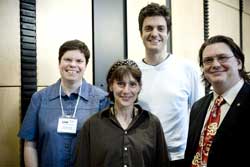Pushing the frontier of molecular sciences

Seen at the May 4 reception for the symposium are, left to right: Heidi Muchall, a researcher with CERMM and assistant professor in Chemistry & Biochemistry, Joanne Turnbull, who will chair the department, Guillaume Lamoureux, new to the department as of this summer and associated with CERMM, and Gilles Peslherbe, CERMM director and an associate professor in both Chemistry & Biochemistry and Physics.
photo by Andrew Dobrowolskyj
CERMM, the Centre for Research in Molecular Modelling, held its annual symposium on May 4, 5 and 6 at the Richard J. Renaud Science Complex.
In only a decade, computational and theoretical chemistry has become an indispensable branch of science, thanks to advances in computer hardware and software. The 1998 Nobel Prize in Chemistry was given to two quantum chemists, Walter Kohn and the late John Pople, and several new journals have been launched in the field.
CERMM was launched at Concordia in 2000 to deliver education in computational chemistry and biochemistry, foster collaboration with research-ers at other institutions, and provide an interdisciplinary forum.
It now has 14 senior members from six institutions. The infrastructure available in CERMM has supported the research of over 10 postdoctoral fellows, 35 graduate students and numerous undergraduate students in atmospheric, biological, inorganic, macromolecular, materials, medicinal, organic, physical, and polymer chemistry.
The invited speakers at the symposium were Sharon Hammes-Schiffer (Pennsylvania State University), André Bandrauk (Université de Sherbrooke), Christopher Bayly (Merck Frosst), Alex Brown (University of Alberta) and Tom Woo (University of Ottawa).